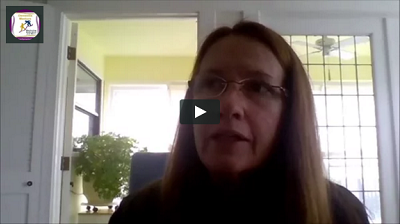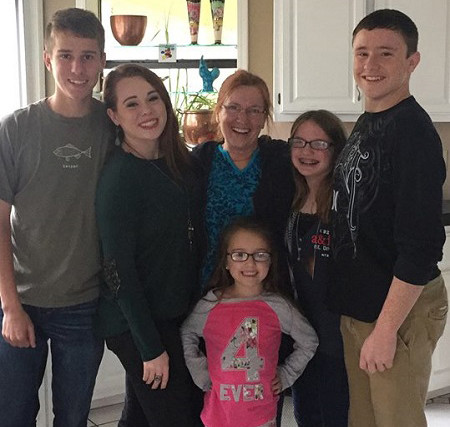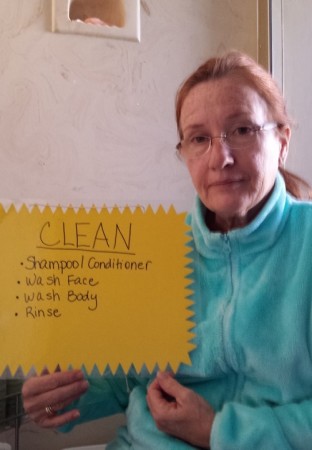 Eleven years ago, when Susan Suchan noticed she was forgetting important details, she received a diagnosis of younger onset Alzheimer’s. She was told to go home and live life, that there was nothing they could do.
Eleven years ago, when Susan Suchan noticed she was forgetting important details, she received a diagnosis of younger onset Alzheimer’s. She was told to go home and live life, that there was nothing they could do.
Like many others who find a way to survive after the initial shock, she could function and continued working as a hospice nurse. “I didn’t pay it much mind,” she said during a recent telephone interview from Oklahoma. “I didn’t even tell anyone and I didn’t even think there was anything unusual about my increasing reliance on sticky note reminders everywhere.” But soon her 23-year nursing career would be cut short.
I viewed a video of this courageous woman on DementiaMentors.org, which aims to help families understand and cope with dementia by featuring mentors who live with different causes of dementia. I reached out to Gary Joseph LeBlanc, who runs the site to arrange for a telephone call with Suchan. Although, she struggles to express herself, her message proves inspiring and informative.
“About three years ago, I began falling over,” she said. She thought it may have something to do with the stresses of midlife and two traumatic life events. Her mother was murdered and her daughter dropped off her 8-month old child and disappeared for three years, according to Suchan.
“I felt cheated and angry with the world,” she said. Yet, she thought she was holding it all together. But her family saw something different. It took her a couple more years to finally take much-needed time off to grieve. Six months later her daughter returned for her child.
Suchan sought help from neurologists, who diagnosed her with frontotemporal lobe dementia (FTD). Like the diagnosis she received eight years earlier, Suchan says, “One neurologist was pretty grim about my prospects and discharged me, saying, ‘Sorry, there’s no medication for this.’”
“I was doing pretty good for another six months to a year, when I noticed my speech began to change. The disease must have been creeping into my cortical basal area.” (Definitely sounds like a nurse!) “I’m an 80% fall risk.”
Suchan speaks haltingly at times, missing a word here and there. Although, I could hear her clearly and understand what she was saying, she reminded me of a person trying to speak another language with difficulty. It takes a lot concentration and energy to express what she means; yet, she is refreshingly energetic and wanting to serve.
Living with short term memory, she doesn’t remember from one activity to the next. Imagine what it’s like to forget that you brushed your teeth or showered.
 When we joked about the abbreviation of her recent diagnosis (FTD) being the same letters for the flower delivery service, “Remember, Susan? Years ago we’d hear about FTD florists,” I offered. “By the way, how old are you?” At first she seemed ready to reply and then hesitated. “I’m not sure, it could be 57 or 58.” She thought about it a moment longer and said, “I think I’m 58.”
When we joked about the abbreviation of her recent diagnosis (FTD) being the same letters for the flower delivery service, “Remember, Susan? Years ago we’d hear about FTD florists,” I offered. “By the way, how old are you?” At first she seemed ready to reply and then hesitated. “I’m not sure, it could be 57 or 58.” She thought about it a moment longer and said, “I think I’m 58.”
Suchan is surrounded by her five grandchildren, ages 6- 17 in this Facebook picture included here with permission.
Chooses to remain independent
My sister and brother-in-law should not have to worry about me.
Suchan wants to remain independent as long as she can. Although, she lives with her sister and brother-in-law, she has worked with her therapist to find ways to incorporate reminders for daily activities most of us take for granted.
She posted a Tips for Hygiene and Bathing video to help others after another traumatic (and embarrassing) experience she did not want others to have.
I went to shower one day and closed the door. I became disoriented. I had no idea where I was. I just knew I needed out. Desperately trying to find a way out, I started pushing everywhere. The door suddenly opened and I landed on the floor. I was extremely frightened and ran around the house screaming for help. My brother in law was home and shocked to find me in this state.
“I don’t want anyone to bathe me or take care of those personal needs. I am capable, I just forget.”
 She has created laminated notes to help her remember to shower: Take a Shower. This will feel good. On the reverse, she lists the steps of showering: Shampoo/ Conditioner, Wash Face, Wash Body, Rinse.
She has created laminated notes to help her remember to shower: Take a Shower. This will feel good. On the reverse, she lists the steps of showering: Shampoo/ Conditioner, Wash Face, Wash Body, Rinse.
As Suchan presents this compelling five-minute video, realize what it takes for her to express herself. Would you be brave enough to do the same knowing your words can mentor others? I was surprised that she spoke without notes. She explains: No, I don’t use any notes. I cannot read and talk at the same time. Multitasking is out of the question.
Click on the link to view her tips for a more a positive outcome with managing one’s hygiene. Susan Suchan offers Hygiene Tips on DementiaMentors.org
Today, what Suchan finds frustrating and confusing is “the lackadaisical attitude and disbelief by… I so desperately want to be an example for the medical field and nobody is listening.”
Asked how she feels about her diagnosis, she immediately answers. “There is a gift to being diagnosed that keeps us present. The bull$h^t is really easy to let go of. What is important is right in front. We have the opportunity to live in the present. And it gives everyone involved (caregivers, too) an opportunity to live a quality of life that we would not otherwise have.”
Susan Suchan was featured recently on a 3-minute video for the AA of Oklahoma.
There is life between diagnosis and death. Yet, I’m aware of becoming unaware. I’m here to break that myth that Alzheimer’s is for older people.
Susan Suchan interview for Alzheimer’s Association – Oklahoma Chapter Event
[Updated 12/6/2017: Link to video removed as it now requires a password.]









Thank you Sheri! Bringing tips and awareness for those diagnosed, to live as independently is good for everyone!
Thank you Susan for sharing your story, you are an inspiration.
Brenda~
You are really helping spread awareness by adding the voices and lived experiences of those living with a diagnosis. I want you to know how pleasant and refreshing it is to be part of your good work! Thank you for your constant attention to the realities.
Thank you for your enthusiastic support, Susan and for helping people live better with dementia.